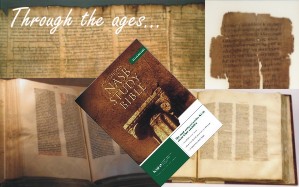
A couple of weeks ago I had a brief post asking why the scientific theory of evolution was a challenge for faith, but a scientific theory explaining weather was not a problem. (See here for the post: God, Science, and Evolution (RJS)). One of the comments on that post leads me to a new question – this one on the Bible, authority, and the role of church tradition in our interpretation of scripture. The commenter said:
What I would find interesting would be a discussion of the kind of categories of biblical literature that we might question now, in terms of their wooden historicity, in light of the weather topic being
discussed here.
This is an excellent topic for discussion. And note – the question is not “What parts of the Bible can we discard” the question is “How do we interpret scripture.” The Bible is true – it is the “Word of God” and yet it is contains many kinds of literature, composed in very different historical contexts. We all use judgment in interpretation. There is no such thing as uninterpreted scripture.
What kinds of Biblical literature might not be strictly historical? Can the Bible contain truth told through story? Does it matter?
Lets consider a few examples as I see them.
A place for story.
Genesis 1-11 is primeval history, not “real” history – and in this sense it tells truth in mythical form. There are many clues within the text that point in this direction. More to the point – the intent of the author was not in historical fact, but in making a specific theological point of some sort. Walton’s book on Genesis One is an important contribution here.
Is Job history or story? I think that Job is story – much like some of the parables of Jesus. There are many clues within the book that point to such a genre. This does not make it false or a lie. After all, if Jesus used story to convey important truths – certainly the OT can also contain truth in story form.
How about Song of Solomon? Why is this considered not historical but Job is considered historical in much of our church?
Jonah? I have no strong position here, as I don’t find “three days in a fish” as a one-off miracle sufficient reason to doubt a historical root in the book. But there are other features that seem to point to a story rather than history.
Thoughts on Daniel?
The form of historical story telling
The historical books in the OT have roots in history – in my opinion very deep roots. Nonetheless there are indications that the books are not straightforward historical reporting.
This is true in Genesis 12-50. There is a general historical flow, but a number of stories repeat very similar themes and there appears to be fleshing out of detail. But in many times and places this is the accepted form of telling history.
The role of composition, culture and contemporary expectations are also apparent in comparisons of 1,2 Samuel, 1,2 Kings, and 1,2, Chronicles. This is not “straight” historical reporting. Stories are given a particular slant and told for a reason. Does this cause problems for our understanding of scripture – or does this inform our understanding of scripture?
Do such examples also influence how we look at the gospels – and even the book of Acts?
The influence of world view and cultural assumptions.
The books of the Bible present the world in the context of the culture of the day. This can be seen in the way that Genesis 1 is framed in ancient near east cosmology, in assumptions about the root causes of disease, in the assignment of mental illness to demon possession. Even weather, including drought and famine fall into this category. Our culture has a very different view of many of these phenomena with solid empirical reasons for those views. We don’t really find the study of meteorology, embryology, medicine, or
to views that differ from that assumed in scripture. How do we know when a statement is simply a reflection of the culture, incidental to the point, and when it is crucial, part of God’s truth?
So – back to the original question.
What kind of categories of biblical literature that we might question now, in terms of their wooden historicity?
What do you think and why?
If you wish to contact me directly you may do so at rjs4mail [at] att.net.

